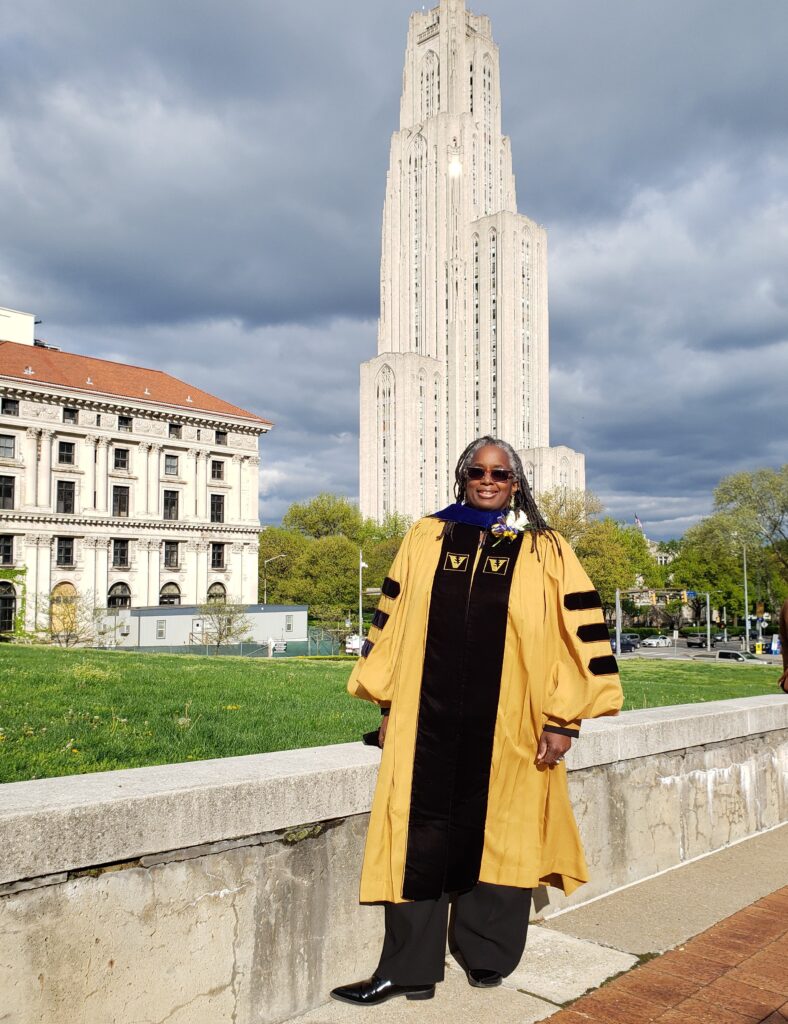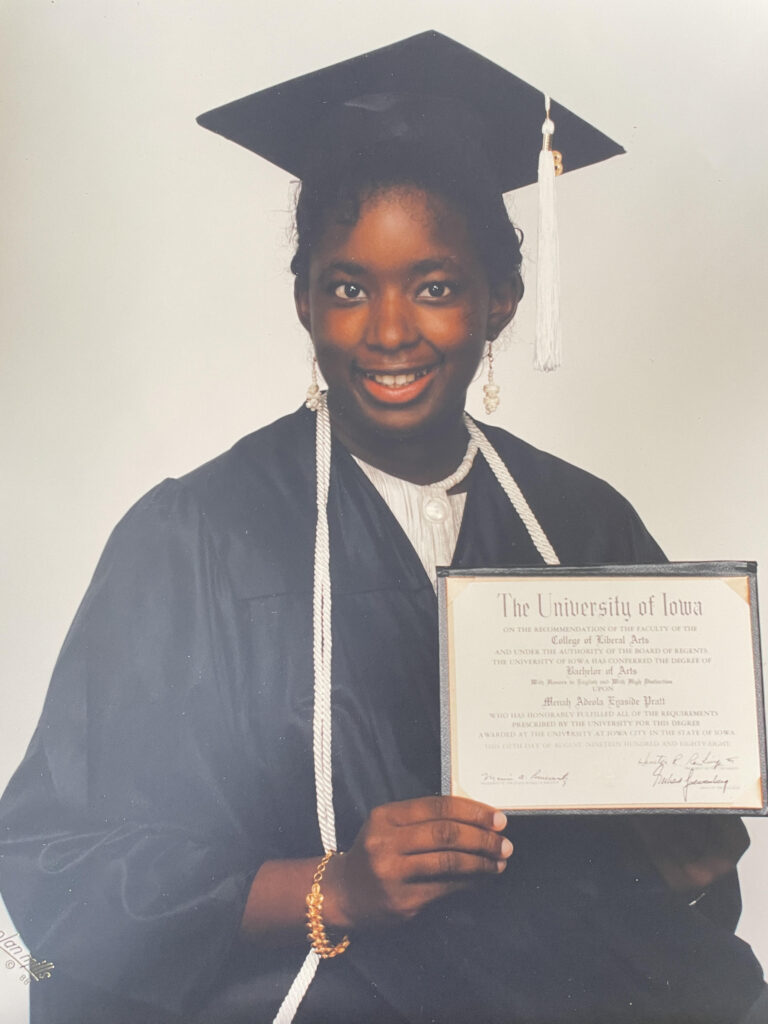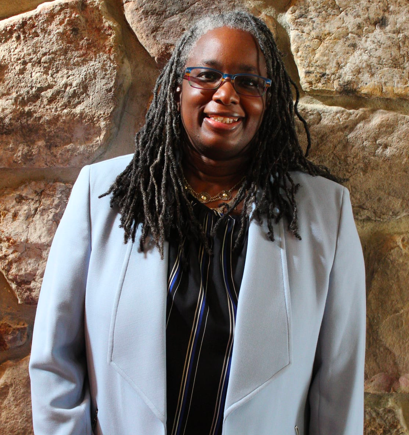Menah Pratt is the Vice President for Strategic Affairs and Diversity, and Professor of Education (full professor with tenure) at Virginia Polytechnic Institute and State University. With over thirty years of administrative, academic, legal, fundraising, advancement, and community engagement experience, Dr. Pratt envisions, leads, and manages large-scale transformational strategic initiatives, including diversity and inclusion efforts in higher education. At Virginia Tech, she oversees the Office for Inclusion and Diversity, the Office for Strategic Affairs, and the Council on Virginia Tech History. She was selected as the 2021 Inclusive Excellence Individual Leadership Award recipient by the National Association of Diversity Officers in Higher Education. She is founder of the Faculty Women of Color in the Academy National Conference (11th year) and the Black College Institute at Virginia Tech (6th year).
FWM: You have an extraordinary background as a writer, public speaker, and academic advocate. Share your background.
I am the Vice President for Strategic Affairs and Diversity and Professor of Education at Virginia Tech. I’ve been working in higher education diversity since I was an undergraduate at the University of Iowa, when I was a tutor for Upward Bound and an office assistant in the Office of Special Support Services for minority students. I have a bachelor’s degree from the University of Iowa with a major in English and minors in Philosophy and African-American Studies. I also received a master’s degree in Literary Studies from the University of Iowa and a master’s degree in Sociology from Vanderbilt University. At Vanderbilt, I pursued a joint-degree program, graduating with a law degree and a doctorate in sociology. As a former judicial law clerk for Judge Sam Ervin, III, on the Fourth Circuit Court of Appeals, I am licensed to practice law in Illinois and Tennessee, with expertise in real estate, construction law, affirmative action, equal employment opportunity, disability, and governance.
So, with five degrees and extensive legal experience, I have felt a responsibility to support educational opportunities for others, particularly people of color. Through writing, speaking, and advocating for underrepresented students and faculty, I am trying to fulfill my call to help others actualize their potential.
FWM: What are the challenges that you have faced during your journey?
Over the course of an almost 30-year career as a Black woman lawyer, professor, and administrator, I have faced extraordinary and sometimes unfathomable injustice, racism, sexism, inequal pay, lack of promotion, macroaggressions, hyper-invisibility, marginalization, and humiliation. Unfortunately, I believe these challenges and experiences are commonplace for women of color in America. As Black women, in particular, our skin color signifies our difference, and makes us vulnerable to stereotypes. In response to the negative stereotypes, we feel an impossible responsibility to “overperform,” and “overachieve,” to “overcome” the biases that have been placed upon us. This extraordinary achievement and #Blackexcellence is not without a cost to our emotional, mental, physical, and spiritual well-being. Yet, many of us have developed a deep reservoir of resilience and inspiration from our ancestors whose burdens were so much greater than ours. Because of them, we are still here, showing up and showing out!

FWM: Your parents, Dr. Mildred Pratt and Dr. Theodore Pratt are notable. What values did your parents teach you and how have these values translated into your important work at the Faculty Women of Color in the Academy National Conference (FWCA).
My father was born in Freetown, Sierra Leone, and came to America for education. He graduated with his bachelor’s degree in physics from Hampton University, a Historically Black College and University (HBCU). He then received his master’s degree and PhD in Nuclear Physics from Carnegie Mellon University in the 1960s. My mother grew up in rural Texas in the 1930s, picking cotton as a child of sharecroppers and barely surviving during the Great Depression. Miraculously, she managed to go to college and graduate from Jarvis Christian College, a small HBCU that allowed her to work and go to school. Finishing at Jarvis, she eventually got two master’s degrees from Butler and Indiana University and a PhD in Social Work from the University of Pittsburgh. As I share in A Black Woman’s Journey from Cotton Picking to College Professor: Lessons about Race, Class, and Gender in America, a biography about my mother’s life, she became a tenured full professor in the 1970s, at a time when less than 1% of full professors were Black women. She often shared her challenges as a professor with me, but also her passion—the Bloomington-Normal Black History Project. As co-founder of the Project, she and her students interviewed almost 100 elderly African-Americans to document their experiences, resilience, and survival strategies. My parents taught me the importance of education and told me that as a Black woman my journey in life would not be easy. They emphasized that I would have to push, persevere, and persist against any challenges that would come my way. I have tried to do that for myself, but also for anyone else I am privileged to help achieve their goals. The Faculty Women of Color in the Academy (FWCA) is a vehicle to fulfill this commitment.

FWM: Tell us about the conference and your mission to empower others today.
Eleven years ago as a faculty member and administrator at the University of Illinois, several women of color faculty were talking about the need for a sacred space to be ourselves. We were tired and exhausted from often being the only woman of color in our departments, experiencing racism and sexism, experiencing interracial trauma, and struggling with our own doubts and fears about our ability to be successful. We thought it might be wonderful to create a space for just us—for just us as women of color in the academy to come together in community. And so, it started, small at first, and growing year after year. Now hosted at Virginia Tech, the Faculty Women of Color in the Academy Conference impacts almost 1000 women of color who are graduate students, administrators, and faculty members every year through the annual conference and virtual healing hours. The purpose of the conference is to help women of color scholars connect, support, and be empowered. Women of color share that the conference is one of the most empowering and transformational experiences in their academic career.
FWM: What are some of your concerns?
Women of color scholars are amazing, incredible, and inspiring. They have powerful insights and wisdom; they have deep compassion and empathy; they have a strong commitment to equity and social justice; they feel a responsibility to serve their communities; and they are often mothers, wives, daughters, and sisters, serving multiple roles in support of others. They are susceptible to significant physical and mental health challenges, and they need to know that they are special, valued, and important. They need to know that they are cherished. They need to know that they can go out in the world and continue to make a difference. After our conference with powerful and inspirational keynotes, workshops, yoga and movement sessions, and a culture café, women of color leave reinvigorated to go back to their institutions and continue to make a difference.
FWM: Tell us about the Black College Institute (BCI), and your event at Virginia Tech which is held every June.
I arrived at Virginia Tech in 2016, serving as the Chief Diversity Officer and the Chief Strategy Officer, with a responsibility to advance InclusiveVT, the institutional and individual commitment to Ut Prosim (that I may serve) in the spirit of community, diversity, and excellence. As a result, many new initiatives have been launched and implemented, including the Black College Institute. Arriving on campus, I noticed the very small number of Black students on campus. Given that Virginia Tech is located in Blacksburg, a small rural community in the southwestern side of the state, I felt it was important to invite parents and their children to visit the campus; to see for themselves the beautiful and spectacular campus; to meet incredible student staff leaders; to learn about the admissions and financial aid process; and to imagine themselves becoming part of the Hokie community.
The Black College Institute is an academic summer enrichment and recruitment program at Virginia Tech. It hosts high-achieving and academically curious rising high school juniors and seniors. Students engage in a week-long leadership and academic engagement program across seven colleges and produce a social justice project on the African American experience. This program has doubled the percentage of African-American students in the freshman class at Virginia Tech from 3.8 percent in 2017 to 8.9% in 2022.
FWM: What are the cornerstones to leadership?
I believe the cornerstones to leadership are a deep self-awareness and reflexiveness; wisdom and the ability to think strategically; an ability to understand roles, relationships, and where power is located and exercised within an organization; and an understanding of what levers can be pulled to advance important initiatives.
FWM: Through your journey as a leader to so many, what has been your proudest moment?
Though I have published four books, two books were particularly meaningful to me. My first book, Critical Race, Feminism, and Education: A Social Justice Model was about my dissertation and the importance of supporting and valuing the educational experiences of Black girls. I explored race loyalty, Black male sexism, White feminism, racism, nationalism, and class issues. It allowed me to share a new transdisciplinary framework for examining issues of power and equity in education combining law and sociology. My most recent book, A Black Woman’s Journey from Cotton Picking to College Professor: Lessons about Race, Class, and Gender in America, is about my mother’s life. She had been writing notes about her life, hoping to write her own autobiography, but she died before she finished it. It was an honor and privilege to transcribe her handwritten notes and to share her life journey, with the hope that it will inspire other women and women of color in higher education to push through barriers to succeed.
FWM: Please share your upcoming projects.
There are two upcoming projects that I am excited to share. The first is about my upcoming book, Blackwildgirl: A Writer’s Journey to Take Back Her Superpower. In this deeply reflective autobiography of acts, stages, scenes, and letters to Love beginning at the age of eight, Blackwildgirl, a childhood queen superpower dethroned in a bargain made by her parents, embarks on a forty-five-year quest to reclaim her crown and become Blackwildgoddess—a fierce warrior for justice in the world. It is an interactive adventure exploring the private life and journals of a young Black girl, beginning at the age of eight, as she struggles and evolves from a tennis player, musician, and college student to become a wife, mother, lawyer, scholar, and writer. Documenting revelations and reflections during her twelve-stage initiation journey in America and the African diaspora, this intimate and introspective autobiography reveals how writing can unearth and give life to women’s powerful, sassy, and willful spirits.
Authentic, vulnerable, and spirit-filled, this captivating and enthralling road map is a must-read for anyone who wants to understand the experiences of girls as they seek to become wild women—women who are fierce and fearless; women who are warriors for themselves and others; women who are committed to cultivating and excavating their spiritual gardens and tilling their spiritual souls to blossom and bloom; and women who want to move from invisible underground lives to aboveground lives of impact and influence by reclaiming their original power and role as women in the world. It is a guide for parents of daughters; girls, women, and wives; and husbands, partners, and lovers of women. It will be published in 2024 by She Writes Press.
The second project is that I am getting ready to start a fellowship with the American Council on Education (ACE). The ACE Fellowship Program is an opportunity to pursue an area of interest through a placement at another institution for a year. In the next few weeks, I will know my placement institution and will begin to work on another book project about diversity and leadership in higher education. Follow me on social media at Menah Pratt to stay connected.


